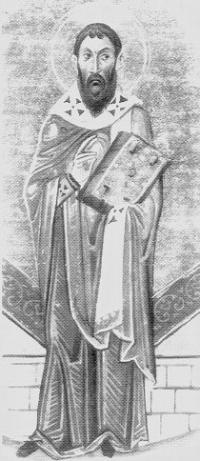March 11th is the traditional feast of Saint Sophronius (560 – 638), patriarch of Jerusalem from 634 to his death on this day in 638. As a young man, Sophronius adopted the life of an ascetic, then a monk, and eventually chosen as patriarch. He wrote voluminously – sadly, much is lost, including a collection of teachings of the early Church Fathers. He is called ‘the Sophist’, not in comparison with the interolucutors of Socrates, but as one who was truly wise. Sophronius was a foe of the heresy of monoenergism, that there was only one ‘energy’ and ‘capacity for choice’ in Christ, namely a divine one, which was a subtle form of the earlier heresy of monothelitism – that there was only one will in Christ – which in turn was a subtle form of the even earlier heresy of monophysitism, that there was only one nature in Christ, a divine one.
The truth, from the Council of Chalcedon (451) is that Christ had two complete natures, divine and human, both with their full operations, of will and choice, but also in perfect harmony one with the other.
Sophronius also strove for peace with the Muslims, who had in his lifetime conquered the Holy Land. The bishop made a treaty with the caliph Umar I in 637, soon after the fall of Jerusalem, and before Sophronius’ own death, ensuring religious freedom for the Church, including preserving the Holy Sepulchre for Christian worship. But that is always a fraught, uncertain thing with Islam; tradition has it that Sophronius was beheaded by the governor Amr ibn al-As, the military conqueror of Palestine, for baptizing Muslim converts.
However the good bishop met his end, we should pray for his intercession for peace in that most sacred land. +











